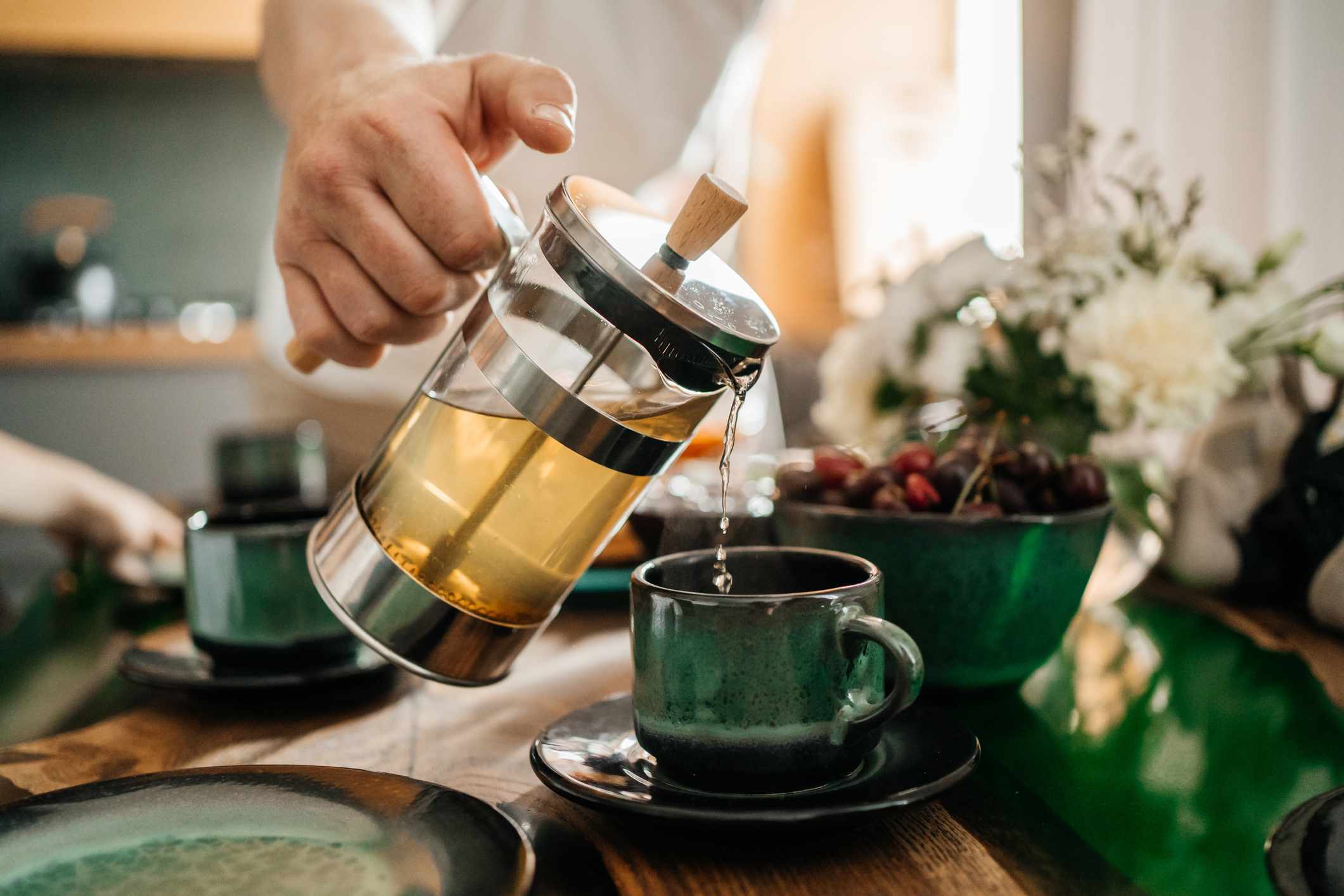
My mom told me that of her three kids, I was her best sleeper. If only that were true now. Even before becoming a mom, I’ve struggled with sleep. My racing thoughts either prevent me from falling asleep right away, or I end up waking in the middle of the night and can’t go back to sleep. Now there is an added challenge of kids randomly climbing into our bed and jostling me awake.
I’m an avid fan of tea and coffee. But because of my sleep challenges, I typically limit myself to two cups of coffee a day and occasionally a green tea in the afternoon. Before kids, I used to drink chamomile tea to help relax in the evenings. Could picking this habit up again help with my sleep?
Sleep-Promoting Properties of Chamomile Tea
Lena Bakovic, MS, RDN, CNSC, Registered Dietitian Nutritionist specializing in gut health, heart disease, diabetes, weight management, oncology, disordered eating, and general health and wellness, explains that herbal chamomile tea can aid with sleep, largely due in part to its naturally calming properties. The sleep-promoting properties of the tea have been recognized and utilized by individuals from varying ethnicities and sections of the world for hundreds of years, as far as we know.
Bakovic shares that the science behind the sleep-promoting properties of chamomile is that it contains an antioxidant called apigenin. Apigenin binds to receptors in the brain, which can decrease anxiety levels and promote relaxation. Both of these properties are beneficial to sleep. A limited amount of scientific research is suggestive that chamomile may be specifically beneficial for cases of mild insomnia.
A study looked at ingesting chamomile in capsule form and its effect on sleep among the elderly in a nursing home. The researchers gave the intervention group 400 mg of chamomile twice a day for four weeks. Compared to the control group, the intervention group’s sleep quality was significantly better.
The Science of Chamomile
Chamomile contains an antioxidant called apigenin. Apigenin binds to receptors in the brain, which can decrease anxiety levels and promote relaxation. Both of these properties are beneficial to sleep.
A systematic review investigated the effects of chamomile on sleep. It showed that chamomile helps reduce how often people wake up during sleep and supports staying asleep. However, it does not affect the duration of sleep, how people function during the day and the percentage of sleep efficiency.
Drinking Chamomile Tea Every Night
If you are planning to drink chamomile tea to improve sleep, Bakovic recommends to consider the following:
- Consistency: When consumed routinely prior to bedtime, the likelihood of the relaxation and sleep-promoting effects of the tea becomes higher.
- Timing: Drinking chamomile tea approximately 30 minutes before bedtime has been suggested as being the most optimal timing in helping the sleep-enhancing effects.
- Caffeine Content: Carefully check the nutrition facts label to ensure that the tea is indeed herbal and caffeine-free. Caffeine consumed close to bedtime can produce the opposite of the intended effects, diminishing sleep quality.
- Dosage: One tea bag per cup of water is a good rule of thumb. Alternatively, one to two teaspoons of dried chamomile flowers per cup of water works just as well.
- Preparation: Allowing the tea to steep for at least five minutes enhances the relaxation and sleep-promoting properties. An overdiluted tea may not provide the same benefits.
Day 1
It’s Monday evening and I’m exhausted. I get the kids to sleep and come downstairs to prepare the tea. I use boiled water from a kettle to brew the dried chamomile flowers. It smells wonderful. I wait five minutes for the tea to seep. My mug is hot, and it feels wonderful in my hands. I sit on the couch with it and stream a cooking show. The host is making a chicken pot pie, and I feel really cozy and comfy before heading to bed at 10:45 pm.
Day 2
It’s 7:00 am and I wake up feeling pretty refreshed. My sleep wasn’t interrupted, and I didn’t have any trouble falling asleep last night. I was worried that drinking the tea would cause me to go to the bathroom in the middle of the night. However, it didn’t. I think limiting it to a cup helped. My son is still asleep, and he didn’t climb into our bed, which is rare. It’s a school day, so it’s going to be busy. However, by 7:30 pm, I’m still a bit energized.
As I read the last bedtime story to my kids, I remember my tea routine. I am eager to do that after the kids go to bed. I use the same mug as last night. It was a gift from my parents when they went on an Alaskan cruise over 10 years ago. I’m studying it while waiting for my tea to seep. It’s the first time I noticed it has a wolf with the Northern Lights. What a mindful moment.
Day 3
It’s another restful night of sleep. I’m pleasantly surprised. I literally went to bed at 11:00 pm, fell asleep and woke up at 7:00 am. I had a full 8 hours of sleep. I open the blinds. The sun is out and I’m enjoying how it feels on my face. The kids head to school, and I start writing. I’ve sent out several emails and did an outline of an article before 10:00 am. I’m on a roll. The day goes smoothly until the kids come home.
My son has swimming lessons, and my daughter has to come with me because my husband has an unexpected showing for his listing. My son doesn’t want her coming, and it’s a battle getting out the door. We come home, but my husband still isn’t back, so I’m left to do dinner by myself. It’s chaos. My son doesn’t want to eat his rice, and he’s going around the house throwing toys. I’m yelling while trying to boil pasta for him.
My husband gets home just in time for the bedtime routine. I’m extra cranky and irritated. I make my tea, but forget about it because I’m on my phone. By the time I remember, the tea isn’t warm anymore. I drink it quickly and go back to scrolling.
Day 4
I wake up at 6:00 am because my son is body checking me. He’s eager to start the day; I’m groggy and in a terrible mood. I couldn’t fall asleep last night because I was slightly annoyed with my husband. In my brain, I know it’s not his fault for leaving me with kids unexpectedly, but I’m irritated at the whole situation. I also feel guilty for yelling at the kids. I trudge through the day, telling myself that the past is the past. One bad day doesn’t make me a bad mom.
The rest of the day is relatively uneventful. By the evening, I’m more myself. The kids go to bed. I am able to mindfully prepare my tea and enjoy it this time. It’s raining heavily outside; the sound of the raindrops falling on the roof is very calming and peaceful. I head to bed at 11:00 pm.
Day 5
I wake up at 6:45 am. My son crawled into our bed last night and woke me up, but I was able to fall back asleep pretty quickly. My energy level is normal. I’m not tired, but I’m not peppy. I’m feeling content and rested.
The day wasn’t as busy. My husband probably felt my slight resentment towards him, so he picked up the slack and did the dinner routine with the kids while I took a shower. I make my tea, and again, I’m able to enjoy it properly while streaming a cooking show. This time, the host is making croque monsieur; it brings me back to our Paris trip many years ago.
Day 6
I wake up later than usual at 7:35 am. I had almost 9 hours of sleep, which is very rare for me. I went to the bathroom once in the middle of the night, around 3:00 am. However, I fell asleep shortly after coming back to bed. It’s Saturday; the kids are still asleep by the time I head downstairs to the kitchen. There’s a peacefulness in the air. It’s a jam-packed day of activities and social events. By the evening, I’m extremely overwhelmed and tired. I make my tea and finish it in three big gulps before heading to bed at 11:30 pm.
Day 7
It’s barely 6:00 am and I’m up already. It was too hot in the room. I had to get up around 2:00 am to open the window. I couldn’t fall back asleep right away. Then I had to use the bathroom. I don’t feel like I slept at all last night. I’m tired, but I can’t seem to calm down. The kids are still sleeping. My husband is quietly snoring. My mind is racing. I start thinking about what needs to be done today, and also things that happened the night before. I want to fall back asleep, but I can’t. I get up after 15 minutes of this, and the day drones on.
Takeaways
It wasn’t too hard to stay consistent with my tea routine for the entire week. Overall, I experienced a slight improvement in my sleep. I found cradling the warm cup of tea soothing. It also kept my hands occupied and somewhat prevented me from going on my phone.
I looked forward to preparing and mindfully sipping my tea every evening. I think the routine of making and the ritual of enjoying the tea itself may have helped my sleep more than the medicinal properties. The couple of days when I was rushed and didn’t have sufficient time to sit and relax were the ones when I didn’t sleep as well.
Should You Drink Chamomile Tea For Better Sleep?
Annie Miller, a LCSW-C, Therapist and Owner of DC Metro Therapy, who specializes in chronic pain, insomnia, anxiety, and trauma, says that chamomile tea is often recommended as a natural sleep aid. There is some evidence to support its calming effects; however, the effects are typically subtle and unlikely to address significant sleep issues on their own.
Design Your Own Behavioral Sleep Cue
Meredith Broderick, MD, sleep neurologist and Ozlo Sleep Medical Advisory Board Member, explains that from a behavioral sleep medicine perspective, any consistent routine you build for sleep can serve as a strong cue for sleep.
Annie Miller, LCSW-C
My advice is to view chamomile tea as one small piece of a larger nighttime routine, not a standalone fix. Let it be part of a consistent wind-down period in the hour or two before bed
— Annie Miller, LCSW-C
“[Your behavioral sleep cue] can be anything from having a cup of tea, [listening to calming sounds], or a special pillow. This aspect of “sleep training” is fun because we can design our cues to be almost anything we want them to be, although they do need to be things that promote sleep and relaxation in that individual,” recommends Dr. Broderick.
Create a Ritual of Winding Down
Miller says that the ritual of winding down with tea may be just as powerful, if not more so, than the tea itself. When you repeat a calming habit before bed, like drinking chamomile tea, it can create a conditioned response in the brain, signalling safety and relaxation. This is especially helpful for people whose brains have come to associate bedtime with stress or racing thoughts.
“My advice is to view chamomile tea as one small piece of a larger nighttime routine, not a standalone fix. Let it be part of a consistent wind-down period in the hour or two before bed, ideally paired with low-stress activities like reading, journaling, or watching a quiet show,” advises Miller.
Address Root Issues Affecting Sleep
Miller shares that sleep is influenced more by thoughts and behaviors than by what you consume. For example, if someone drinks chamomile tea but then lies in bed worrying about whether they’ll sleep, that anxiety can override any calming effects of the tea.
“Consistency, nervous system regulation, and a shift in your relationship to sleep are far more effective in the long run than any one product,” advises Miller.



